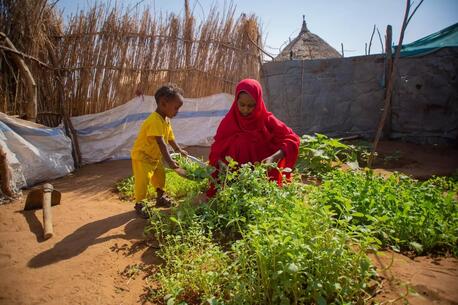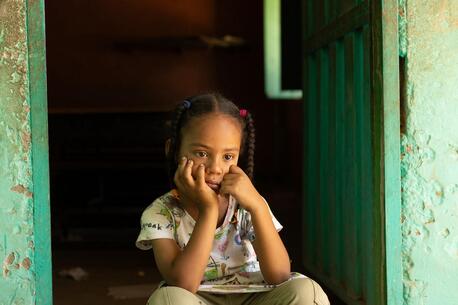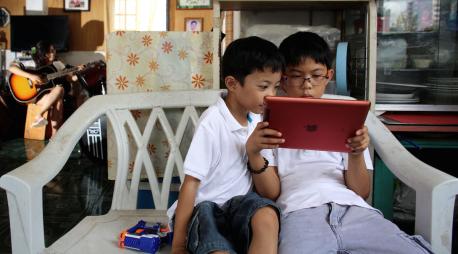
Keeping Kids Safe Online in the Age of COVID-19
With young children and adolescents spending a lot more time on learning platforms and virtual hangouts these days — their lifelines while on lockdown — UNICEF and partners warn of a corresponding rise in online predatory behavior. What governments, technology companies, educators and families can do to mitigate the risks and keep kids protected.
UNICEF has long been a fan of digital solutions as offering huge opportunities for sustaining and promoting children's rights. But the more time spent on the Internet and social media, the more vulnerable children may become to sexual predators, cyberbullying and other forms of online harm.
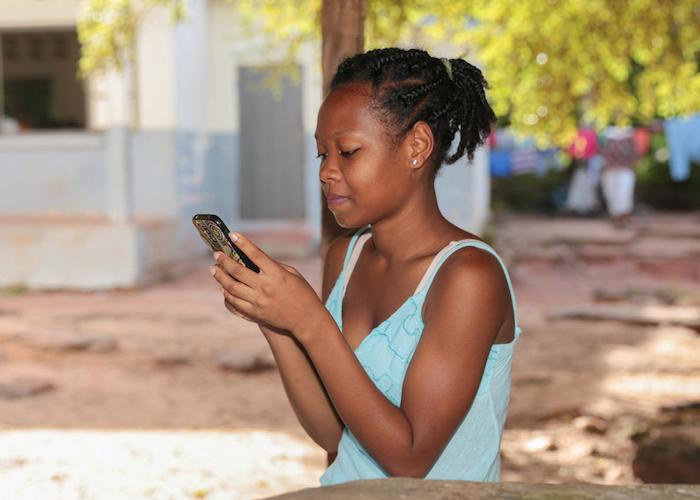
Maria, 16, has a smart phone and a social media account. She is also the vice-president of a middle school club focused on child rights in Mahajanga, a city in the Boeny region on the northwest coast of Madagascar. “If we understand what our rights are, we can play a role in protecting and promoting them,” she says. Despite being very careful, Maria told UNICEF that strangers have nevertheless tried to add her using fake accounts. © UNICEF/UN0285176/Ralaivita
It is too soon to say how all this extra time online will impact children. But several watchdog groups warn that heightened anxiety and feelings of loneliness among children on COVID-19 lockdown — and an over-abundance of unstructured time — make kids easier targets. The UK's National Society for the Prevention of Cruelty to Children describes the pandemic as having created a "perfect storm" for offenders. The FBI has also issued an alert.
In a recent interview with The Canadian Press, UNICEF Executive Director Henrietta Fore confirmed that there was evidence that online predators were taking advantage of the pandemic. “We've got a couple of worrying signs,” Fore said. "There's a lot of grooming, a lot of sexting, a lot of trafficking.”
A call to action for governments, businesses, educators and parents to take immediate steps to keep kids safe online
In response, UNICEF and partners are calling on governments, businesses, educators and parents to take immediate action to mitigate the risks and ensure safe and positive online experiences for children.
In a newly released technical note, governments are urged to:
- Bolster core child protection services to make sure they remain open and active throughout the pandemic;
- train health, education and social service workers on the impacts that COVID-19 may have on child well-being, including increased online risks;
- step up awareness raising and educational initiatives on child online safety; and
- make sure social service providers, schools, parents and children are aware of local reporting mechanisms, including local helplines and hotlines.
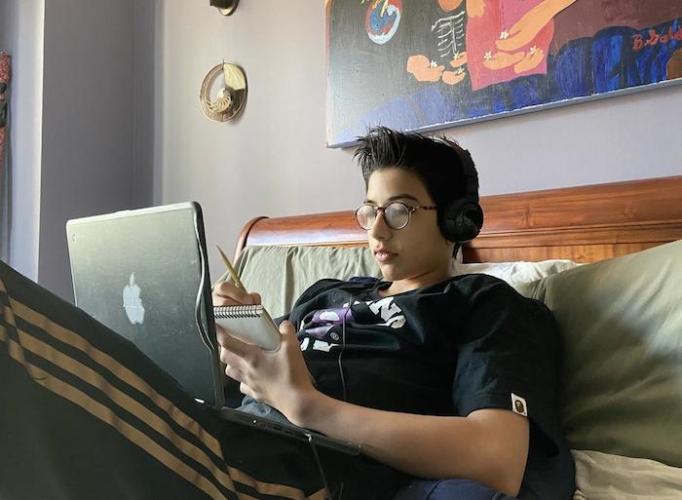
Jack, 14, attends online school from home in New York City while his parents telework. Most governments around the world have closed schools temporarily in an attempt to contain the spread of COVID-19. With kids spending a lot more time online, they face an increased risk of online exploitation and abuse, UNICEF and partners warn. A newly released technical note provides guidance for how governments, businesses, educators and parents can mitigate those risks and keep kids safe. © UNICEF/UNI313125/Adelson
Tech companies should:
- Ensure online platforms have enhanced safety and safeguarding measures, especially virtual learning tools, and that they are clearly accessible to educators, parents and children;
- promote and facilitate child safety referral services and helplines;
- develop standard moderation policies that are aligned with children’s rights;
- employ built-in protection measures while innovating as appropriate; and
- provide internet connectivity to improve access for disadvantaged children in low-income households.
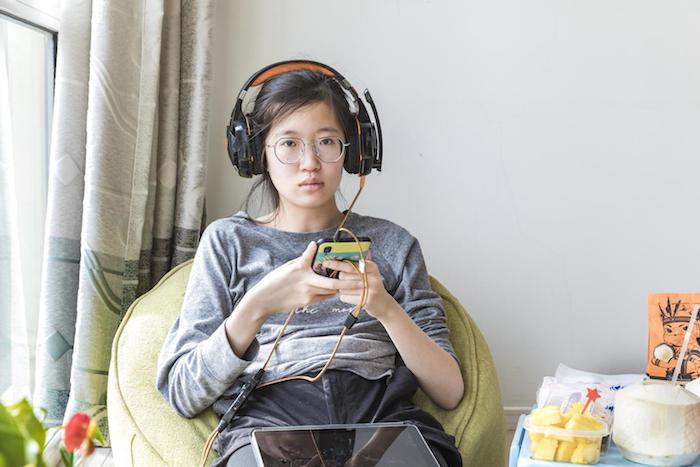
Xiaoyu, an 11th grader in Beijing, is one of the hundreds of millions of primary and secondary school students across China who switched to online learning after schools closed due to COVID-19. © UNICEF/UNI304639/Ma
Educators, according to the new guidance, should:
- Update current safeguarding policies to reflect the new realities for children learning from home;
- promote and monitor good online behavior; and
- ensure that children have continued access to school-based counselling services.
A pivotal role for parents to play in keeping kids safe online
The advisory also details the important role of parents and caregivers in teaching kids safe online practices.
Among other guidance, UNICEF and partners recommend that parents:
- Ensure children’s devices have the latest software updates and antivirus programs;
- have open dialogues with children on how and with whom they are communicating online;
- work with children to establish rules for how, when, and where the internet can be used;
- be alert to signs of distress in children that may emerge in connection with their online activity; and
- be familiar with school district policies and local reporting mechanisms and keep support helplines and hotline numbers handy.
UNICEF has long advocated for taking a balanced approach — encouraging kids to enjoy the benefits of digital technology as a way to be informed and empowered and to make their voices be heard while also making sure their rights are upheld.
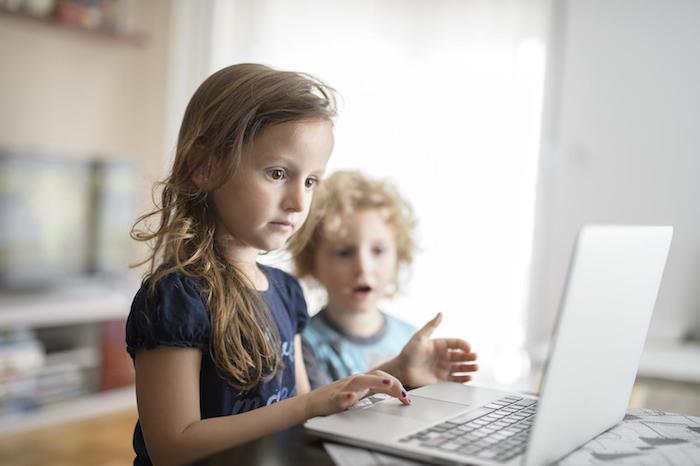
Milica, 6, and Petar, 4, from Podgorica, Montenegro, share a laptop. © UNICEF/UN0271528/
In 2018, UNICEF released an industry toolkit aimed at helping online service providers, game and toy brands, mobile operators and device manufacturers strike that balance. That resource followed the 2017 report Children in a Digital World, an indepth look at digital access as both a game changer and a new dividing line, bringing new dangers as well as new opportunities.
The new advisory from UNICEF and partners builds on these past advocacy initiatives. “Under the shadow of COVID-19, the lives of millions of children have temporarily shrunk to just their homes and their screens,” Fore said. “We must help them navigate this new reality.”
For more information, read the technical note issued by UNICEF together with partners Global Partnership to End Violence Against Children, the International Telecommunications Union, the United Nations Educational, Scientific and Cultural Organization (UNESCO), the UN Office on Drugs and Crime (UNODC), WePROTECT Global Alliance, The World Health Organization and World Childhood Foundation USA.
For more parenting tips on how to help keep children safe online, visit unicef.org.
Learn more about how UNICEF is supporting home learning during the pandemic.
Support UNICEF's global response efforts. Your contribution can make a difference.
Top photo: Two brothers photographed on March 2016 at home in the Central Visayas city of Cebu, Philippines, where UNICEF helped developed CyberSafety lesson plans for educators and has provided care and support services for child victims of online sexual exploitation. © UNICEF/UN014968/Estey

